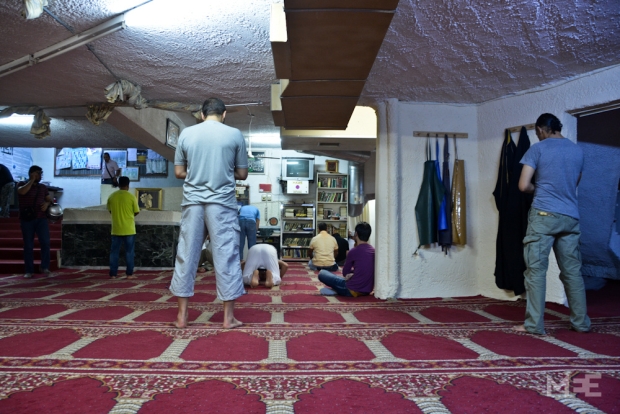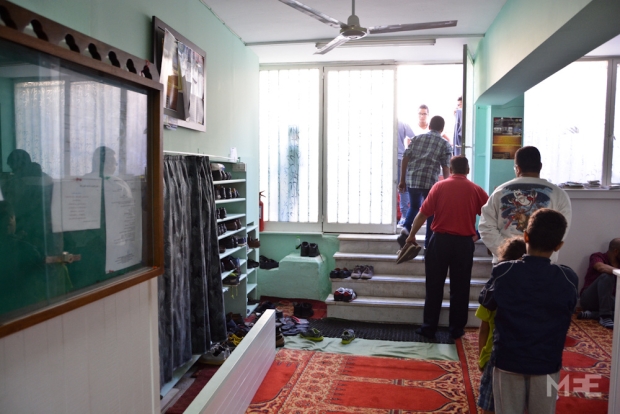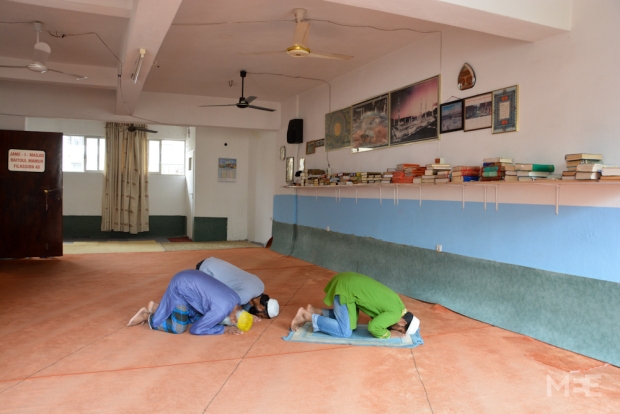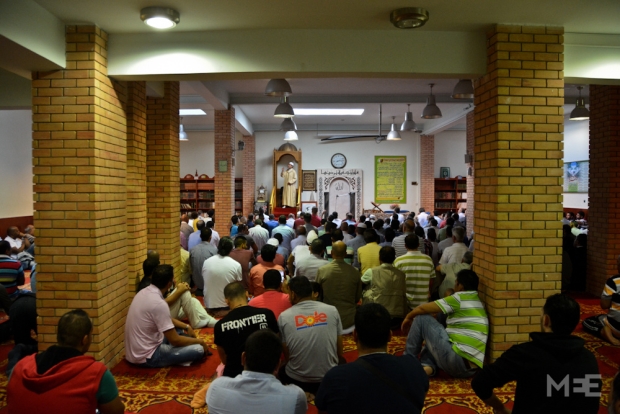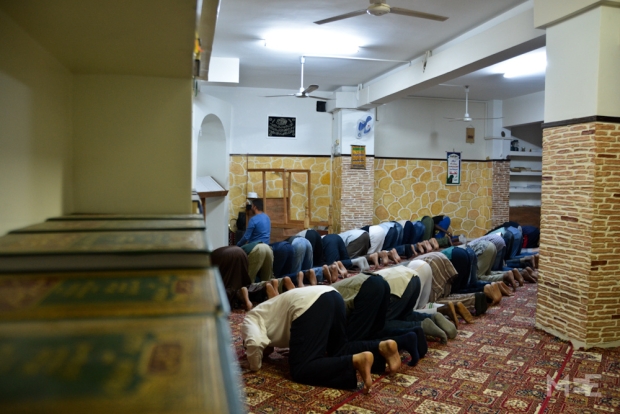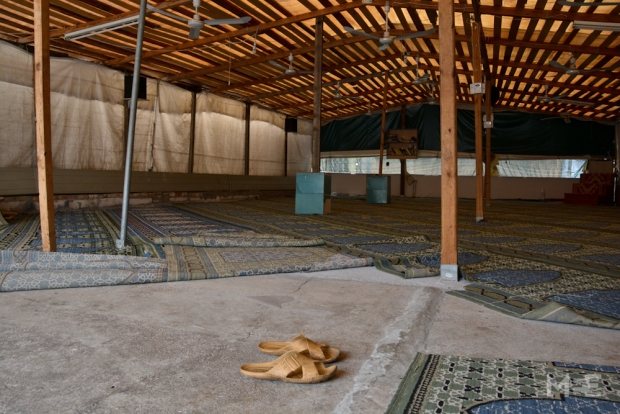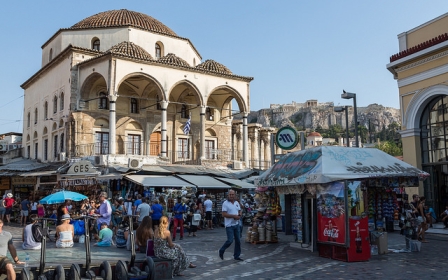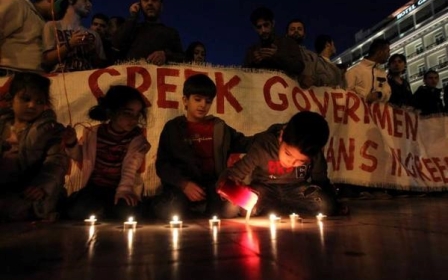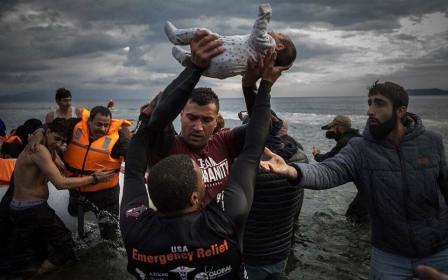First official mosque for Athens creates disquiet in Muslim communities
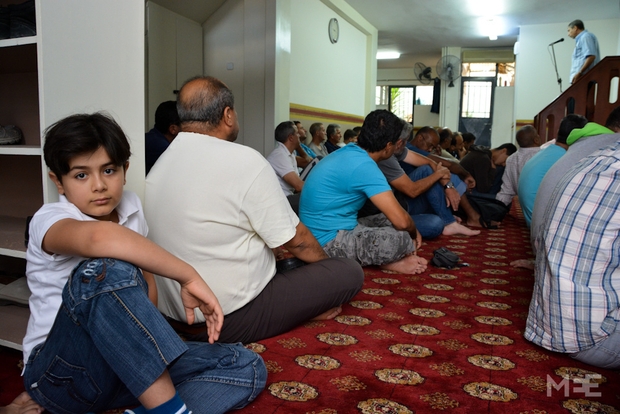
ATHENS – If you take a walk up one of the winding alleyways near Omonoia Square in the centre of Athens, you might come across the familiar sight of a group of men, some wearing traditional clothing from their country of origin, gathered around talking on their mobiles and chatting to one another, seemingly waiting for something.
If you were to follow them through a huge iron door and up three flights of stairs, you would come to a room approximately 100 square metres wide that is covered in wall-to-wall red carpeting. The walls are painted in white and green and a wooden shoe rack stands just outside the entrance.
You would soon realise that this is not just a regular apartment. There is no furniture, except for a bookcase holding books predominantly written in Bengali and a podium with a microphone at the far end of the room. On the walls hang a couple of clocks, decorative framed phrases from the Quran and a wall hanging depicting Masjid al-Haram (the Sacred Mosque) in the holy city of Mecca.
This is only one of the estimated hundred or so makeshift mosques that exist in the Greek capital.
Athens is the only European capital without an official mosque and it has been that way since the end of Ottoman rule almost 200 years ago.
Hidden behind closed doors, in underground garages, basements or rented apartments, the more than 200,000 Muslims living in the city have had to be inventive in order to find a quiet place to practise their faith.
The first state-funded mosque
But the situation is about to change. At the beginning of August, after many delays since it was first discussed back in 1894, the Greek parliament approved plans for the construction of the first government-funded mosque at a former military base at Votanikos, near central Athens.
The project, which will be undertaken by a consortium of Greece’s biggest construction firms (J&P-Avax, Terna, Aktor and Intrakat) was due to start in November and is scheduled to be completed by April 2017.
According to Giorgos Kalantzis, the secretary general for religious affairs: “It is estimated that the mosque in Athens will have a capacity of approximately 350 people and it will be under the supervision of the Ministry of Education and Religious Affairs. The governing committee of the mosque of Athens shall administer, manage and maintain the mosque." The cost of this construction is forecast to be a little less than 887 million euro ($938m) and will be funded in its entirety by the Greek state.
Speaking in parliament in August, Nikos Filis, the minister of education, research and religious affairs, made his intentions clear when he assured the Muslims of Athens they would have an official mosque: “The existence of makeshift mosques is a shame for the country and the Muslims who live here,” he said.
In response to criticism of the plans, he said: “It is much better having an official mosque that you know where it is and who controls it, and the people inside are safe, rather than many unofficial ones."
Nationalist far-right Greek political party Golden Dawn has criticised the project, accusing the government of being an “anti-Hellenic state”. In a speech at Votanikos, Nikolaos Michaloliakos, founder and leader of the party, said the mosque would be a "den of Islamists and terror".
In the meantime, Athenian Muslims, whose numbers have increased over the past two years with the influx of thousands of refugees and migrants from the Middle East and Africa, will have to continue visiting the makeshift mosques, run by people from a variety of backgrounds, often from Egypt or Bangladesh. Different denominations including Sunni and Shia Muslims attend, but all Muslims who want to pray are welcomed.
Closing the 'neighbourhood mosques'
Over the past year, three makeshift mosques in Attica, and one in Thiva, near Athens, were given licences to operate as places of worship, which is required under Greek law.
“The requirements of the law regarding authorisation to establish and operate places of worship include compliance with rules of public order (in terms of urban planning, street planning and public health) aimed at safe use of buildings and protection of their users and local residents. Additionally, the name of the religious minister must be submitted as well as the VAT identification number of the worship place,” says Kalantzis.
After the completion of the mosque at Votanikos, many of the makeshift mosques will be forced to close down, despite many worshippers opposing this move.
Ahmed, from Cairo, Egypt, has been living in Greece for more than a decade. He is just one of the dozens of immigrants MEE spoke to in the past few weeks who does not believe that closing the “neighbourhood mosques” will help the Muslim community.
“I feel that closing those mosques will make things even harder for us [Muslims]. It is not that easy for everyone to go to Votanikos, especially for those of us who have to go back to work after the prayer,” he explains.
When the economic crisis hit Greece in 2009, a large number of immigrants who had found shelter in Greece decided to leave the country in search of jobs and a better quality of life.
As a result, the number of private makeshift mosques operating in Athens was reduced by at least 40 percent according to some estimates.
“As many as 60 percent of immigrants who have lived in Greece for years have left the country since 2011 for central and north Europe," explains Moawia M Ahmed, president of the Greek Forum of Migrants, who was born in Sudan and came to Greece in the late 1970s. “This mosque they plan to build mainly serves political purposes and doesn’t really provide a solid solution for the Muslim community,” he says.
He believes the authorities should legalise as many of the makeshift mosques as possible for the benefit of the Muslim community.
Being a Muslim in Athens
Greeks are widely known for their hospitality, generosity and friendliness. Yet some Greeks are still wary of Muslims. According to a study done by the Pew Research Center, approximately half of the Greek population is concerned with security because of the refugee crisis.
“We are not terrorists. We like peace. Islam is not what some of you might believe from what you see on the television or read in the newspapers,” says Ibrahim, a young man from Bangladesh who tries to go to the mosque close to his home at Ampelokipoi almost every day.
Sayd, a construction worker from Egypt, spent more than 20,000 euros of his own money at the end of 2009 to rent and restore a basement and turn it into a beautiful mosque in the neighbourhood of Agios Nikolaos.
However, the apartment building's manager at the time was not keen on the idea. “She caused me many problems. She was calling the police almost every day telling them that I wanted to bring down the building. But when the policemen came they could see that I was only trying to restore the place and make something beautiful for everyone.”
Events took a positive turn when a new manager took over. “We don’t have problems any more and the neighbourhood has accepted us. After all, we are all human beings and we just want to follow our faith like everyone else,” he concludes.
While Athenian Muslims wait for the construction of the first state-sanctioned mosques, so too begins the wait to see what impact it will really have on their small community of worshippers.
New MEE newsletter: Jerusalem Dispatch
Sign up to get the latest insights and analysis on Israel-Palestine, alongside Turkey Unpacked and other MEE newsletters
Middle East Eye delivers independent and unrivalled coverage and analysis of the Middle East, North Africa and beyond. To learn more about republishing this content and the associated fees, please fill out this form. More about MEE can be found here.


